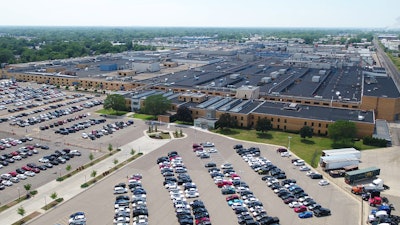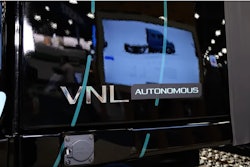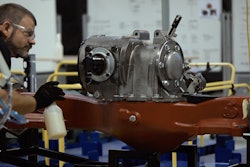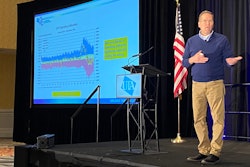Trucking news and briefs for Thursday, Dec. 12, 2024:
Daimler investing $285M into Detroit plant
 DTNA anticipates a capital investment of up to $285 million for the project, which will be located on the Detroit Manufacturing Campus in Redford Township, Michigan.Daimler Truck North America
DTNA anticipates a capital investment of up to $285 million for the project, which will be located on the Detroit Manufacturing Campus in Redford Township, Michigan.Daimler Truck North America
Daimler Truck North America (DTNA) this week announced its intent to make significant investments in its Detroit Manufacturing Plant located in Redford Township, approximately 15 miles west of downtown Detroit.
DTNA said this investment is made in partnership with the local community, Michigan Legislature, and the Michigan Economic Development Corporation (MEDC) as part of state’s Critical Industry Program, which provides financial support to create capital investments in Michigan.
“Our Detroit Manufacturing Plant, with its legacy of over 85 years in Michigan, stands as a testament to innovation and progress,” said Matt Pfaffenbach, vice president of powertrain operations. “This expansion is about more than just innovation; it’s about creating job opportunities and upskilling our workforce to meet the demands of tomorrow’s technology, while helping to stabilize the heavy-duty supply chain.”
The company said its plans include:
- Reinvestment in the Internal Combustion Engine (ICE) Platform: Continuing to support existing technologies.
- Enhancement of Research and Development (R&D) Facilities: Promoting innovation and technological advancements.
The investment aims to modernize and enhance the existing plant to maintain its current production capacity and innovation of ICE components, DTNA said, which remain crucial for many commercial trucking applications, and support the growing demand for cleaner, more fuel-efficient engines and components, fostering an environment for expanded research and development in the commercial trucking sector.
DTNA anticipates a capital investment of up to $285 million for the project, which will be located on the Detroit Manufacturing Campus in Redford Township, Wayne County. In addition to the more than 2,000 existing jobs at the facility, the company noted more than 400 new jobs are expected to be created at the site, strengthening its role and workforce in Michigan’s automotive future. The plant has a longstanding partnership with the United Auto Workers, maintaining Michigan as a core hub of DTNA’s operations and supporting a stable and skilled workforce in the area.
Additionally, the MEDC has incentivized the project with a $27.7 million performance-based Critical Industries Program grant, supporting job creation and economic growth in Michigan. DTNA also received Michigan Strategic Fund support for a State Essential Services Assessment abatement with an estimated value of up to $3.29 million. Construction is expected to begin in early 2025, contingent on the completion of planning and approval processes.
FMCSA issues guidance on rear impact guard labels
The Federal Motor Carrier Safety Administration this week issued a new guidance document to provide clarity around the requirements for rear impact guard certification labels.
On rear impact guards, FMCSA posed the question of if an “illegible, incomplete, or missing rear impact guard certification label” establishes a violation of 49 CFR 393.86(a)(6), or if it indicates that the impact guard did not meet the National Highway Traffic Safety Administration’s (NHTSA) strength and energy absorption requirements applicable to manufacturers at the time the trailer was built.
FMCSA’s answer: “No.” The agency said the regulation in question requires rear impact guards to be permanently marked or labeled as required by Federal Motor Vehicle Safety Standard (FMVSS) No. 223. NHTSA also determined that labels that wear, fade, or are removed during repair do not indicate a current compliance issue with the requirements in FMVSS No. 223.
FMCSA added that it’s also aware that a motor carrier may not be able to replace an illegible, incomplete, or missing certification label.
The agency said rear impact guards should be inspected to ensure compliance with all other FMVSS Nos. 223 and 224 requirements, including:
- General requirements (§ 393.86(a)(1))
- Guard width (§ 393.86(a)(2))
- Guard height (§ 393.86(a)(3))
- Guard rear surface (§ 393.86(a)(4))
- Cross-sectional vertical height of the horizontal member (§ 393.86(a)(5))
FMCSA noted that the guidance does not have the force and effect of law and “is intended only to provide information and clarity regarding existing requirements under the law or agency policies.”
[Related: Trailer safety: How to prevent underride crashes and save lives]
FMCSA clarifies when ‘exempt’ ag haulers can receive HOS violations
In addition to the rear impact guard guidance, FMCSA on Dec. 4 published new guidance related to the hours-of-service exemption for drivers transporting agricultural commodities.
The regulations in 49 CFR 395.1(k) exempt drivers from the HOS regulations during planting and harvesting seasons, as determined by each state, who transport certain agricultural commodities from their source to locations within a 150 air-mile radius.
FMCSA laid out a scenario in which a driver is inspected while operating under the ag exemption. That driver sometimes operates outside of the air-mile radius and keeps logs for those instances. Upon request from the inspector, the driver voluntarily provides a copy of the logs covering one or more days prior to, and outside of, operating under the ag exemption. The inspector finds an HOS violation on the previous day when the driver was not operating under the exemption. Can the driver be cited for that previous-day exemption?
FMCSA said this is fair game. When exempt drivers operate beyond the 150 air-mile radius, the HOS regulations apply. If a driver currently operating under the exemption is inspected, they are not required to provide a copy of their record of duty status. However, if the driver voluntarily provides their logs, an officer can cite any HOS violations that occurred before the driver was operating under the exemption.
The driver cannot be placed out of service for those previous violations because the driver is currently exempt from Part 395, but a driver can be cited for prior violations because the driver was not exempt when they occurred.
“To repeat -- 49 CFR 395.1(k) does not retroactively immunize drivers from citations for previous HOS violations simply because they are currently eligible for the agricultural exemption,” FMCSA said.
As with the rear impact guard guidance, FMCSA noted this guidance is only intended to provide clarity around existing regulations.











